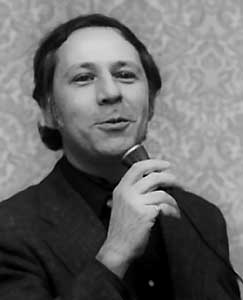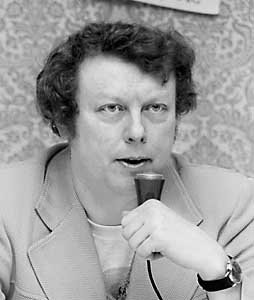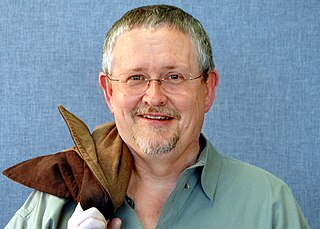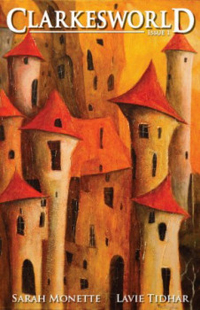
Benjamin William Bova was an American writer and editor. During a writing career of 60 years, he was the author of more than 120 works of science fact and fiction, six-time winner of the Hugo Award, an editor of Analog Science Fiction and Fact, an editorial director of Omni; he was also president of both the National Space Society and the Science Fiction Writers of America.

Harlan Jay Ellison was an American writer, known for his prolific and influential work in New Wave speculative fiction and for his outspoken, combative personality. Robert Bloch, the author of Psycho, described Ellison as "the only living organism I know whose natural habitat is hot water."

Poul William Anderson was an American fantasy and science fiction author from the 1940s until the 21st century. Anderson wrote fantasy novels, historical novels, and short stories. His awards include seven Hugo Awards and three Nebula Awards.

Geoffrey Alan Landis is an American aerospace engineer and author, working for the National Aeronautics and Space Administration (NASA) on planetary exploration, interstellar propulsion, solar power and photovoltaics. He holds nine patents, primarily in the field of improvements to solar cells and photovoltaic devices and has given presentations and commentary on the possibilities for interstellar travel and construction of bases on the Moon, Mars, and Venus.

Gordon Rupert Dickson was a Canadian-American science fiction writer. He was inducted into the Science Fiction and Fantasy Hall of Fame in 2000.

Kate Wilhelm was an American author. She wrote novels and stories in the science fiction, mystery, and suspense genres, including the Hugo Award–winning Where Late the Sweet Birds Sang. Wilhelm established the Clarion Workshop along with her husband Damon Knight and writer Robin Scott Wilson.
Mormon fiction is generally fiction by or about members of The Church of Jesus Christ of Latter-day Saints, who are also referred to as Latter-day Saints or Mormons. Its history is commonly divided into four sections as first organized by Eugene England: foundations, home literature, the "lost" generation, and faithful realism. During the first fifty years of the church's existence, 1830–1880, fiction was not popular, though Parley P. Pratt wrote a fictional Dialogue between Joseph Smith and the Devil. With the emergence of the novel and short stories as popular reading material, Orson F. Whitney called on fellow members to write inspirational stories. During this "home literature" movement, church-published magazines published many didactic stories and Nephi Anderson wrote the novel Added Upon. The generation of writers after the home literature movement produced fiction that was recognized nationally but was seen as rebelling against home literature's outward moralization. Vardis Fisher's Children of God and Maurine Whipple's The Giant Joshua were prominent novels from this time period. In the 1970s and 1980s, authors started writing realistic fiction as faithful members of the LDS Church. Acclaimed examples include Levi S. Peterson's The Backslider and Linda Sillitoe's Sideways to the Sun. Home literature experienced a resurgence in popularity in the 1980s and 1990s when church-owned Deseret Book started to publish more fiction, including Gerald Lund's historical fiction series The Work and the Glory and Jack Weyland's novels.
James C. Christensen was an American illustrator and painter of religious and fantasy art.
Mary A. Turzillo is an American science fiction writer noted primarily for short stories. She won the Nebula Award for Best Novelette in 2000 for her story Mars is No Place for Children, published originally in Science Fiction Age, and her story "Pride," published originally in Fast Forward 1, was a Nebula award finalist for best short story of 2007.
Aurealis is an Australian speculative fiction magazine published by Chimaera Publications, and is Australia's longest running small-press science-fiction and fantasy magazine. The magazine is based in Melbourne.

Orson Scott Card is an American writer known best for his science fiction works. He is currently the only person to win both a Hugo Award and a Nebula Award in consecutive years, winning both awards for both his novel Ender's Game (1985) and its sequel Speaker for the Dead (1986) back-to-back. A feature film adaptation of Ender's Game, which Card co-produced, was released in 2013. Card also wrote the Locus Fantasy Award-winning series The Tales of Alvin Maker (1987–2003).
Michael Shayne Bell is an American science fiction writer, editor, and poet. He won the second quarter of the 1986 Writers of the Future contest with his story, "Jacob's Ladder". His short works have been nominated for the Hugo and the Nebula Awards. The Association for Mormon Letters awarded him for editorial excellence with his Washed by a Wave of Wind: Science Fiction from the Corridor anthology in 1994. Baen Books published Nicoji, a novel based on his short story of the same name, in 1991.

Clarkesworld Magazine is an American online fantasy and science fiction magazine. It released its first issue October 1, 2006 and has maintained a regular monthly schedule since, publishing fiction by authors such as Elizabeth Bear, Kij Johnson, Caitlin R. Kiernan, Sarah Monette, Catherynne Valente, Jeff VanderMeer and Peter Watts.

Analog Science Fiction and Fact is an American science fiction magazine published under various titles since 1930. Originally titled Astounding Stories of Super-Science, the first issue was dated January 1930, published by William Clayton, and edited by Harry Bates. Clayton went bankrupt in 1933 and the magazine was sold to Street & Smith. The new editor was F. Orlin Tremaine, who soon made Astounding the leading magazine in the nascent pulp science fiction field, publishing well-regarded stories such as Jack Williamson's Legion of Space and John W. Campbell's "Twilight". At the end of 1937, Campbell took over editorial duties under Tremaine's supervision, and the following year Tremaine was let go, giving Campbell more independence. Over the next few years Campbell published many stories that became classics in the field, including Isaac Asimov's Foundation series, A. E. van Vogt's Slan, and several novels and stories by Robert A. Heinlein. The period beginning with Campbell's editorship is often referred to as the Golden Age of Science Fiction.
Neil Clarke is an American editor and publisher, mainly of science fiction and fantasy stories.
Geoffrey Maloney is an Australian writer of speculative short fiction.

Life, the Universe, & Everything: The Marion K. "Doc" Smith Symposium on Science Fiction and Fantasy is an academic conference held annually since 1983 in Provo, Utah. It is the longest-running science fiction and fantasy convention in Utah, and one of the largest and longest-running academic science fiction conferences. An annual proceedings volume, Deep Thoughts, publishes the academic papers and main addresses given at the event. The symposium was named, jokingly, after the Douglas Adams novel Life, the Universe and Everything.

Kameron Hurley is an American science fiction and fantasy writer. In 2014, Hurley won a Hugo Award for Best Fan Writer and Best Related Work. Hurley also won the 2014 Locus Award for Best Nonfiction, the 2011 Sydney J. Bounds Award for Best Newcomer, presented by the British Fantasy Society, and the 2011 Kitschies for Best Debut Novel. Her work has also been nominated for the Arthur C. Clarke Award, the BSFA Award, and the Nebula Award; shortlisted for a Locus Award for Best First Novel; and made the Tiptree Award Honor List "for works of science fiction or fantasy that expand or explore one's understanding of gender." Her 2019 novel The Light Brigade was nominated for a Best Novel Hugo Award, Arthur C. Clarke Award, and The Dragon Award for Best Military SFF Novel, and won the Premio Ignotus Award for foreign novel.

Uncanny Magazine is an American science fiction and fantasy online magazine, edited and published by Lynne M. Thomas and Michael Damian Thomas, based in Urbana, Illinois. Its mascot is a space unicorn.
"The Singular Habits of Wasps" is a science fiction/horror story by Geoffrey A. Landis, about Sherlock Holmes. It was first published in Analog Science Fiction, in April 1994.










